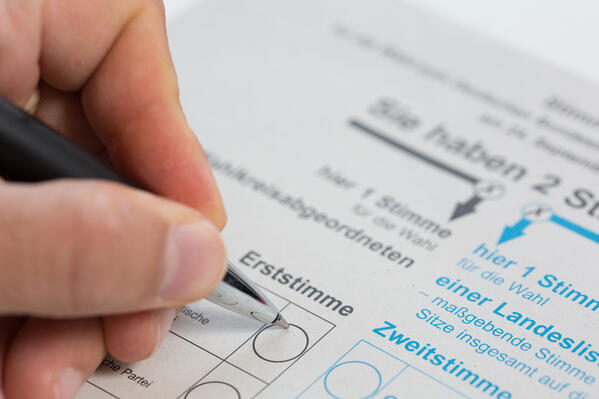Changes in electoral law

In October 2020, the Bundestag The Bundestag The Bundestag is made up of the elected representatives of the German people. In principle elections to the Bundestag are proportionally representative, with each party’s share of the vote in the election reflecting the number of seats it occupies in the parliament. But the electoral system also… Read more › agreed to reform Germany’s electoral law. The first changes will already apply to the 2021 general election, but the reform will not be fully implemented until the next general election in 2025. The primary objective is to reduce the number of MPs.
The background to this is the country’s personalized proportional representation system. The model with first and second votes gives rise to the difficulty of the so-called “overhang mandates”: These occur when a party has lots of first votes and thus significantly more direct mandates than it is entitled to seats in parliament based on the second votes. The other parties are then given mandates in compensation. While there are actually a total of 598 seats designated in the Bundestag, these additional mandates can increase that number significantly. After the most recent general election in 2017, the parliament grew to as many as 709 members and thus became bigger than ever. Experts fear that this will limit its ability to work.
Fewer constituencies in the 2025 Bundestag election
For this reason, the Grand Coalition of the CDU/CSU and the SPD agreed on a two-stage reform process during the 19th legislative period: As early as the 2021 general election, overhang mandates are to be partially offset against list mandates. If the number of Members of Parliament exceeds 598, other parties will only receive compensatory mandates if they have more than three overhang mandates. In a second step, for the general election in 2025 the number of constituencies will be reduced. Currently there are 299. A commission of representatives from politics and academia will develop proposals for this.
The electoral reform is controversial. Critics are primarily concerned that the efforts will not be sufficient to significantly reduce the size of the Bundestag The Bundestag The Bundestag is made up of the elected representatives of the German people. In principle elections to the Bundestag are proportionally representative, with each party’s share of the vote in the election reflecting the number of seats it occupies in the parliament. But the electoral system also… Read more › .


